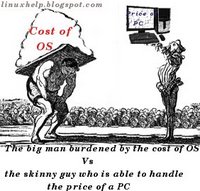Does an OS have to be as costly or even more than the hardware on which it runs? This seems to be the question that I am forced to ponder myself again and again. When I open the day's newspaper, I am besieged by ad after ad offering to sell PCs at bargain prices, some of them as low as $250. To list an example, I came across this newspaper ad offering the Dell Poweredge SC430 Server which features an Intel Pentium D Dual Core Processor 820 with 1GB DDR2 ECC SDRAM, a 250 GB SATA hard drive and an embedded Gigabit NIC for around $ 455 (US Dollars). Oh yeah, they also throw a 1 year onsite warranty and free lifetime telephonic support to boot.
Now when you consider this with the estimated price of the yet to be released Windows Vista (ranging from $199 to $399), one can't help but gawk at its price. Not to talk about Microsoft's future plans of recognizing the OS and Software it sells as a service rather than a product - in which case the end user is left with the further liability of shelling out money on a yearly basis for upgrades - something similar to paying mortgage for your home.
Why should the OS be priced at par or even more than the hardware on which it runs ? Shouldn't it be the other way round? For instance, lots of efforts and tangible materials go into the making of each computer. And this effort put into it proportionately increases as you manufacture/assemble larger quantity of computers. It doesn't decrease or remain the same by any count. Then there is the logistical nightmare of storing and delivering the finished product to the end users. Also when you sell a computer, you end up relinquishing control over the product in exchange for the money.
 But when it comes to developing a software or OS for that matter, none of the above rules hold true precisely because an OS is intangible by nature. It is possible to distribute the OS to 10s, 1000s, millions or billions of people and still the creators of the OS will have the original OS with them. The logistical problems are a bare minimum for the simple reason that the OS can be distributed via electronic medium such as the Internet. And if they are providing boxed versions, it takes up much less floor space than computers.
But when it comes to developing a software or OS for that matter, none of the above rules hold true precisely because an OS is intangible by nature. It is possible to distribute the OS to 10s, 1000s, millions or billions of people and still the creators of the OS will have the original OS with them. The logistical problems are a bare minimum for the simple reason that the OS can be distributed via electronic medium such as the Internet. And if they are providing boxed versions, it takes up much less floor space than computers.Yes efforts and costs are involved in creating a robust OS. But once the main coding is done and finished, the further costs incurred by the OS company is mostly on marketing, bug fixing and in adding new features. For instance, of the reportedly 57,000 strong employees working at Microsoft world wide, a large percentage of them do jobs related to marketing.
This obvious mismatch in pricing of proprietary OSes is precisely one of the reasons that GPLed OSes are increasingly gaining favor among the computer users. The ideological factors apart, it doesn't cost an arm and a leg to acquire GNU/Linux even if you opt for one of the numerous GNU/Linux distributions which are sold for money. And the fast paced advances of the various projects developed to run on this OS (Gnome, KDE, Wordprocessors, Web Browsers, Graphic editors.....) make sure that the end user is not left wanting in his computing needs.
So the next time your hands start itching to buy the latest state of the art proprietary OS , ask yourselves this question. Is the mismatched price of the OS justified ? And what are the other avenues one has which gives more or less the same user experience without lightening your wallet by any measure?
No comments:
Post a Comment